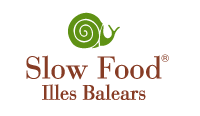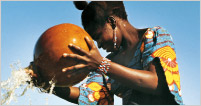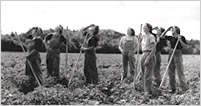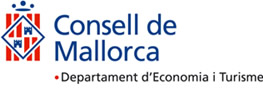It is the application of concepts and principles of ecology to the design, development and management of sustainable agricultural systems. Its aim is to create agricultural systems that are similar to natural ecosystems, and that are harmonically integrated in nature. It differs from traditional methods because it considers as central elements like biodiversity, nutrient cycling, interactions between crops, animals and soils, and the regeneration of resources.
It is the integration of agricultural crops and forest crops. It can be done simply, growing cereals and/or winter legumes beneath fruit trees like almond trees or fig trees, or with more complexity, for example combining various productive strata. In agroforestry systems, ecologic and economic interactions are combined to achieve synergies between the parts. As a science, it is a multidisciplinary approach, and should involve the participation of farmers or countryfolk in the identification, design and execution of research activities.
It is the art and science of restoring forest ecosystems, integrating the conservation of local biodiversity, organic production and fair trade. Products derived from Analog Forestry (AF) are called Forest Garden Products (FGPs). AF tries to create a physical structure and a series of ecological relationships that are analog to the natural state of the forest, using trees and plants that are similar in their size, ecological function and structure, and at the same are useful to human beings.
The Ark of Taste project was launched in 1996 by Slow Food, an ideal rescue vessel that travels the world to support small productions of gastronomic excellence that are threatened by industrial agriculture, environmental degradation and standardization. The Ark aims to rediscover, catalog and promote foods which are at risk of extinction but have productive and commercial potential and are closely linked to specific communities and cultures. The Scientific Commission of the Ark of Taste, with the support on the ground of local Slow Food Convivia, evaluates a wide range of products such as meats, wines, cheeses, cereals, vegetables or local breeds following precise selection criteria: gastronomic excellence, links to the land, artisanal production, sustainability of the business and danger of extinction. Today the Ark lists more than 900 unique foods from 50 countries around the world that are threatened by industrial standardization.
Biodynamic agriculture was presented in 1924 as an application of Rudolf Steiner's anthroposophy. The term comes from the greek bios (life) and dynamis (energy), meaning that this type of agriculture functions in accordance with the energies that create and promote life, looking for a balanced relationship between the soil and plant varieties, ensuring healthy food for animals and for human beings.
+ info: www.rudolfsteinerweb.com/
It is a practice by which researchers or companies illegally use the biodiversity of developing countries and the collective knowledge of indigenous peoples or farmers to create products and services that they then exploit at the commercial and/or industrial level, without the authorization of their creators or users. Exploiting, manipulating, exporting and/or commercializing biological resources, breaking the rules of the 1992 International Convention on Biological Diversity, is considered biopiracy. It means stealing and monopolizing ancient knowledge regarding the use of natural resources.
Collectively, our consumer choices can bring great change to how food is cultivated and produced. To highlight this, Slow Food coined the term co-producer, a consumer who goes beyond the passive role of consumption and takes an interest in those that produce our food, how they produce it and the problems they face in doing so. In actively supporting food producers, we become part of the production process. Co-producers not only buy, they also learn and appreciate, asking for further information in order to recognize qualitative differences and feed themselves in a more healthy, responsible and enjoyable way.
Behind the products we consume there is always a story. Fair trade is an alternative to conventional trade that guarantees producers from the South a decent salary and working conditions, contributing to the sustainable development of the area. Through its certification or label, fair trade products guarantee that certain principles have been respected, such as: creating opportunities for marginalized or disfavoured collectives, transparency and democracy to guarantee the basic needs of communities, fair prices for producers and long-term equitable commercial relationships, fighting child labour, equality between men and women, and respect for nature.
+ info: www.comerciojusto.org
This is a new socioeconomic model to produce food and organize its sale and distribution. Its aims are to increase the quality of food products and the care of soils and animals, while reducing the financial risk that producers take. It also allows small farmers access to a small-scale guaranteed market, through weekly deliveries of food products. This type of agriculture works through a high degree of participation by consumers, who establish a committed relationship with producers. CSA was born in the 60s in Japan, Germany and Switzerland as a response to unhealthy food and increasing urbanization of agricultural soils. It then spread on to the USA and Canada.
These are organized groups of consumers who work, generally voluntarily, to offer its members the possibility of jointly buying and self-supplying themselves with quality, organic food products at reasonable prices. With this aim, cooperatives contact producers directly, shortening the supply chain, in order to know which products to buy and how they have been produced.
Es una práctica de consumo que se lleva a cabo con conciencia e información sobre las condiciones medioambientales, sociales y económicas bajo las que se han elaborado los productos que consumimos. Antes de comprar cualquier producto debemos preguntarnos quién lo ha producido, si su producción ha sido respetuosa con la naturaleza y los derechos sociales de los productores locales, y si realmente lo necesitamos.
+ info: www.consumoresponsable.com
Convivia are local Slow Food chapters. They are groups of members who work to spread the Slow Food philosophy and make it a reality. According to their own tendencies and imagination, each convivium organises activities and events, ranging from simple dinners and tastings, where members come together to share the everyday joys of food, to visits to local producers and farms, conferences and discussions, film festivals, Taste Education courses for children and adults, promoting CSA’s and Earth Markets, and many other events and projects to get to know local foods and producers and to educate others about them. The Convivia build networks between people interested in a gastronomy that considers that ‘eating is an agricultural act’, just like producing is gastronomic act. Convivia are the backbone of Slow Food movement and they are made possible only through the members, who volunteer their time and energy. Today, there are more than one hundred thousand members in over 1,300 convivia in 150 countries.
It involves the strategies and tools that intend to favour and allow responsible practices by owners and users of a territory for the conservation and appropriate use of land and their natural resources. It is mainly aimed at private properties, and favours actions in rural areas in order to involve farmers as well as owners of the land in the conservation and proper use of landscapes, agricultural practices and cultural conditions.
+ info: www.custodia-territorio.es
These are farmers' markets that have been established according to guidelines that follow the Slow Food philosophy. These community-run markets are social meeting points, where local producers offer tasty, healthy, quality food directly to consumers at fair prices and guarantee environmentally sustainable methods. In addition, they are focused on preserving the local food culture and biodiversity of edible plants and breeding.
+info: www.earthmarkets.net
A new gastronomy that understands gastronomy as a multidisciplinary approach to food that enables us to make conscious food choices for the benefit of our palate, our environment and our society, recognising the strong links between them all. The word came about to express the evolution of the Slow Food movement, which began defending good food and wine, gastronomic pleasure and a slower pace of life, and then logically expanded its horizons to embrace issues such as quality of life and the health of the planet we live on.
It is a key sustainability indicator. Its aim is to evaluate the impact on the planet of a specific way of life. It calculates the amount of ecologically productive land that is required to produce the resources and absorb the waste involved in the way of life of a particular population. + info: www.footprintnetwork.org
Constituye la desaparición del tejido social y cultural en el que florece la diversidad genética de un cultivo, así como la destrucción de la información relacionada con el uso y destino de las semillas en cuestión. Han transcurrido miles de años para acumular la información concentrada en un genotipo, y cuando desaparece la información o el tejido social que le da uso se presenta la erosión genética.
Coined by Slow Food in 2004 for the first Terra Madre meeting, this term defines all the people who are connected through the food production chain and who are closely linked to a geographic area: cooks, farmers, seed guardians, fisherfolk, wild plant collectors, stockbreeders, researchers, young activists, etc. The term refers to the place of origin of these producers and keepers of knowledge, and reflects a new local economy based on food, agriculture, tradition and culture. Members of a local food community work in sustainable, small scale ways to produce quality food products. They share the problems caused by industrial intensive agriculture and the standardization imposed by a food industry aimed at mass markets. Today, the Terra Madre network includes over 2,000 food communities in 150 countries.
During 2007 and 2008, a huge increase in the price of food at the global level provoked a food crisis in the poorest regions of the world, as well as political instability and social upheavals in various countries. Some of the reasons were poor crops, a growing demand for agrofuels in developed countries and an increase in numbers of the middle classes in places like Asia, who are varying their food habits, demanding more variety and more meat, meaning an increasing demand on agricultural resources. Other reasons closely linked to this crisis are the constant increase of the price of oil, which has a direct effect on the costs of fertilizers and transport, and a fall in food reserves around the world. Added to the instability caused by speculators in trade markets, all these factors increased food prices at a global scale. In developed countries, price increases become a main concern for the masses. According to the World Bank, around 100 million people could be at serious risk due to such a food crisis.
It is the right and the responsibility of farmers and consumers to know and decide about how and where our food is produced, and to rebuild links between the rural and the urban.
Slow Food's approach to agriculture, food production and gastronomy is based on a concept of food quality defined by three fundamental interconnected principles which are synthesized in the slogan “good, clean and fair”. Good relates to taste: good products are those who give pleasure to the senses. Clean food is produced and consumed in a respectful and sustainable way, taking into account the entire cycle of production and the ecosystem as a whole. It is sustainable food with positive effects on our health, animal welfare, agriculture, food biodiversity, the landscape, climate change... Fair is a concept related to the organisation of work and markets, which must guarantee prices that are accessible to consumers, as well as fair economic benefits and conditions for producers and the recognition they deserve for their work.
Slow Food considera el alimento como sinónimo de placer, toma de conciencia y de responsabilidad. La búsqueda del placer gastronómico se une al papel activo del consumidor, que considera el acto de comer no sólo como una necesidad biológica, sino también como un placer a compartir con los demás. Nuestras decisiones conscientes en materia alimentaria inciden decisivamente sobre el mercado y, por tanto, sobre la producción alimentaria, ya que pueden ser dirigidas a beneficio del paladar, de la naturaleza y de la sociedad. El hedonismo responsable es un antídoto contra la uniformidad impuesta por los procesos industriales que nos abocan a la insipidez global.
Adds a holistic element to this concept: neo-gastronomists cultivate a responsible and wide relationship with food, combining an interest in the culture of food and wine with a desire to defend the biodiversity of local food and the environment, considering the act of eating as not merely the fulfillment of a biological need, but also as a convivial pleasure to be shared with others.
Neo-gastronomists are aware of the fact that their decisions regarding food provoke direct effects on the market, and in consequence on food production, and that our daily choices can be responsible and sustainable.
Es una metodología de diseño de entornos humanos a partir de técnicas ambientales sostenibles y tecnologías apropiadas. Se basa en la interconexión ecoeficiente de los diferentes elementos del diseño, siguiendo el modelo de funcionamiento de los ecosistemas naturales, donde todo está interconectado. Supone una aproximación holística a los sistemas agrícolas. La palabra permacultura, como explica su creador Bill Mollison, es una contracción de agricultura y cultura, porque las culturas no pueden sobrevivir sin una base agrícola sostenible.
This is the name of a Slow Food project which is creating a European network of schools working to improve student meals and increase awareness regarding food issues. It was launched in 2009, and today 12 schools from 10 European countries are participating in this EU-funded project, each working on various aspects of improving their canteen service - reviewing tenders, shortening the food chain to use fresher local produce, addressing waste management and promoting seasonal local food – as well as integrating food and Taste Education into their classrooms. Participating schools are connected through their website.
+info: www.dreamcanteen.ning.com
A commercial sustainable fish market promoted by Slow Food. Since 2004, it is celebrated every two years in the Italian city of Genova. Fish communities related to sustainable fishing gather at this port city to discuss the crisis of the marine environment and explore the possibilities of benefitting from marine resources in a reasonable way. Visitors can attend conferences, workshops, tastings and other activities, while also enjoying and buying excellent sea produce that has been captured using good practices.
+info: www.slowfish.it
Este concepto fue introducido en 1996 por la organización Vía Campesina en Roma con motivo de la Cumbre Mundial de la Alimentación de la FAO. Es la facultad de cada país para definir sus propias políticas agrarias y alimentarias de acuerdo a objetivos de seguridad alimentaria y desarrollo sostenible. Ello implica la protección del mercado doméstico contra los productos excedentes que se venden más baratos en el mercado internacional, y contra la práctica del dumping o venta por debajo de los costes de producción. Este nuevo concepto, constituye una ruptura con relación a la organización actual de los mercados agrícolas puesta en práctica por la OMC. En contraste a la seguridad alimentaria definida por la FAO, que se centra en la disponibilidad de alimentos, la soberanía alimentaria incide también en la importancia del modo de producción de los alimentos y su origen. Resalta la relación que tiene la importación de alimentos baratos en el debilitamiento de producción y población agraria locales.
+ info: www.viacampesina.org
Taste education allows people to make daily decisions regarding food in a conscious and responsible way, allowing consumers to become active participants in the process of changing destructive production patterns. In fact, as they choose good, clean and fair food products, consumers become co-producers. Slow Food’s approach to food education is based on the reawakening and training of the senses and on acquiring knowledge with the idea that food means culture, conviviality and pleasure, and that the act of eating can influence values, attitudes and emotions. Slow Food organizes projects and courses in Taste Education, at all levels and accessible to all: from children to teachers, from our members to anyone who participates in local or international activities.
Launched by Slow Food in 2004, brings together people who wish to preserve and promote sustainable methods of traditional food production. Day by day, the Terra Madre family grows, enriches and organizes itself to better defend local products, gastronomic cultures linked to a specific territory.
Terra Madre is all at once a project, a network and a biennial gathering, and has become the philosophy towards which the Slow Food movement is aimed. Terra Madre connects 5,000 farmers, 1,000 cooks, 250 universities and 1,000 youth from 150 countries, who meet every two years in Turin to debate, exchange and cooperate. Producers are central to the network and the protagonists of a new gastronomy. The cooks carry out a key role, as they interpret a territory, enhancing and giving value to it through their creativity. The project is conceived with the aim of protecting, supporting and giving a voice to small producers, but also of changing the very system that harms them, by joining the forces of those who -through their daily choices- can influence future policies: consumers, chefs and cooks, schools, research bodies, NGOs, associations, youth... Because only by multiplying local actions within a global vision can we achieve a significant impact.
+info: www.terramadre.org
The Slow Food Youth Food Movement (YFM) is a project that arose from a joint initiative between Slow Food USA and the University of Gastronomic Sciences (UNISG) in Torino, and proposes the creation of a network of young farmers, producers, students, cooks and activists united to defend their vision of the future of food. It aims to become a global alliance of youth committed to the production of good, clean and fair food for all, united to redefine local and regional food systems according to the principles of social justice and sustainability. Within YFM, youth who are committed with the food system connect with each other through projects and exchanges, providing spaces where opinions can be exchanged.
+ info: www.youthfoodmovement.org
Se trata de variedades que se han domesticado en el mismo lugar de donde son originarias, pasando de su estado silvestre al cultivado.
Las variedades locales son aquellas que han pasado de mano en mano, a través de varias generaciones de agricultores que las han ido seleccionando según sus preferencias y de acuerdo con las condiciones ambientales de la zona, aunque procedan de otros lugares del mundo. Un ejemplo: el tomate de ramallet, aunque los tomates son originarios de Centroamérica.
+ info: www.ib.varietatslocals.org


.jpg)



